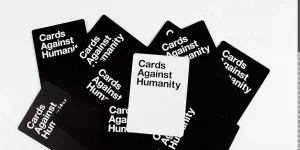
For my game, I chose Cards Against Humanity, an analog card game created in 2011 by Josh Dillon and seven of his classmates at Highland Park High School. The game famously has a theme of crude jokes, dark humor, and offensive content. With this theme, the game is intended at an older demographic — at least high school age, if not college age. The game would be inappropriate for younger players and would likely lead to significant awkwardness if played with family. However, if played with high school or college age friends, the game is quite fun!
The game requires at least three players and technically has no upper limit on the number of players. However, I’ve found that the best games have at least five players and typically have no more than eight or nine players. If there are too many players, then the game can drag on and lose its fun.
Cards Against Humanity contains two sets of cards: a large deck of white cards and a somewhat smaller deck of black cards. Written on each white card is a humorous or offensive phrase, and written on each black card is a phrase with a missing slot or slots. At the beginning of the game, each player draws seven random white cards. One player then selects a random black card — this person is the judge of this round. The other players each select a white card or cards from their hand which they believe would fit in the missing slot(s) on the black card. The judge then selects the white card(s) which they believe best completes the missing slot(s) on the black card, and whoever’s white card(s) were selected gets to keep the black card. Play then continues, with the next person clockwise becoming the judge for the next found, and players with less than seven white cards drawing cards so that they have seven white cards again. The objective of the game is to win five black cards — once a player does so, they are the winner and the game ends. Some interesting dynamics emerged when playing Cards Against Humanity. For example, since I was only able to select from a limited number of white cards (the seven white cards in my hand) when playing, I wanted to save the more humorous white cards for black cards which I thought I could win. As a result, I sometimes elected to play a worse card on some rounds in order to save my better cards for future rounds.
Cards Against Humanity evokes fun through fellowship and expression. I found myself laughing often at many of the odd or humorous card combinations, and had a lot of fun talking with friends causally while we played. Unlike a lot of other games I often play, which can become competitive, I found Cards Against Humanity to be a causal and light-hearted experience. I believe that this emerged from the game’s theme of humor — it’s hard to become seriously competitive when everyone is laughing. The game’s cards are extremely creative — many of the cards contained phrases which I would have never thought of — and when combining them together with other equally-creative black cards, the creativity reached new heights. This creativity and humor makes the game work — there are so many random combinations that the game doesn’t become stale.
At the same time, there were a couple of cards that caused my friend group to be taken aback. When we saw those cards, for a few seconds we were jolted out of the game and the atmosphere became slightly uncomfortable. We loved the really creative cards — however a couple of the cards made jokes that we felt crossed the line and took us out of the immersive experience. We looked up the game on Wikipedia after playing out of curiosity and found that the game has removed some cards at times in updated editions because they crossed the line. This shouldn’t be necessary — players shouldn’t ever feel uncomfortable in that way when playing. Especially given the popularity of Cards Against Humanity, I think more careful vetting is needed with feedback from large, diverse user groups to ensure that while cards are humorous, they don’t cross the line.
Cards Against Humanity is extremely similar to Apples to Apples — its gameplay itself is identical. However, what differentiates Cards Against Humanity is its distinct lack of family-friendliness — it is not afraid (sometimes wrongly) to make dark or offensive jokes a part of its play. I found myself laughing much more often when playing Cards Against Humanity — I think that this contributed to a better fellowship experience and more fun overall. However, it does require slightly more vulnerability — players must be willing to make dark jokes in order to win.


